- Home
- Scott Mariani
The Bach Manuscript Page 2
The Bach Manuscript Read online
Page 2
‘The parents and sister refuse to say where, mein Obersturmbannführer.’
‘They do, do they? We will see about that.’ Krebs rose from the piano stool and marched towards the hallway. Moments like these called for a little greater authority than the likes of Jundt could summon up. Krebs drew his service automatic from its flap holster.
As Krebs reached the crowded hallway, he heard a sudden sound behind him and turned in surprise to see the young boy who seemed to have appeared from nowhere and was now racing across the salon, heading for the piano.
Jundt shouted, ‘There he is!’ as though his commanding officer were blind.
Miriam Silbermann screamed, ‘Gabriel!’
Krebs realised that the boy must have been hiding behind the wood panels, watching him as he sat at the piano. Running to the instrument, the twelve-year-old snatched the manuscript off its rest, and clutched it tightly. He yelled, ‘Filthy Boches, you won’t take our family treasure!’
His elder sister screamed, ‘Run, Gabriel!’ One of the soldiers silenced her with a harsh blow from his rifle butt.
And Gabriel ran, still grasping the precious manuscript to his chest as though nothing could persuade him to let it go. He made for the French window and slipped through, dashing towards the lawned garden and the fence at the bottom.
Krebs watched him go. Then calmly, unhurriedly, he walked towards the French window. Stepped through it, feeling the sun’s warmth on his face.
The boy was running fast. If Krebs let him run very much further, he would reach the fence and disappear into the trees, and it might take an entire Waffen SS unit all day to scour the surrounding countryside in search of the brat.
Krebs raised his pistol and took careful aim at the running child’s back. It was a long shot, but Krebs was an accomplished marksman.
The gun’s short, sharp report cracked out across the garden. Inside the house, Vidette Silbermann howled in anguish.
The boy stumbled, ran on two more staggering paces, then fell on his face and lay still.
More screams from the house, once again cut short by the soldiers. The Obersturmbannführer walked over to where Gabriel Silbermann lay dead, hooked the toe of his shiny jackboot under his body and rolled him over. A trickle of blood dribbled from the child’s lips. He was still clutching the music manuscript as if he wouldn’t give it up, even in death.
Krebs bent down and removed it from the boy’s fingers. It sickened him to see that there was blood on it, but not because it was the blood of an innocent child he had just killed. Rather, it was like seeing a rip in an old master painting. The manuscript had survived all these years, just to be indelibly stained by the blood of a filthy Jew. Disgusting. Krebs carefully slipped the precious object inside his coat before more harm could come to it. Then walked back towards the house to resume his duties. A pretty much routine day had turned out to be a lucky one for him.
Soon, the rest of the Silbermann family would be taken to their temporary new home at the Drancy internment facility, along with more than thirteen thousand other Jews rounded up by Nazi troops and French police in what was known as ‘Opération Vent Printanier’, or ‘Operation Spring Breeze’. From Drancy, not long afterwards, Abel, Vidette and Miriam would find themselves on the train that would deliver them to their terrible fate.
Only one of them would ever return.
Chapter 1
Oxfordshire
Many years later
The country estate covered a spread of some thirty acres, a fraction of the grounds it had commanded in former, grander days, but still large enough to keep the big house well secluded from neighbouring farm cottages and the nearby village of Wychstone. The estate was entirely surrounded by a ten-foot-high stone wall, built long ago by an army of local labourers. Its main entrance gates were tall and imposing, all gothic wrought-iron and gilt spikes, set into massive ivied pillars crowned with carved stone heraldic beasts of Olde England that had guarded the gateway since 1759 and bore just the right amount of weathering and moss to convey an impression of grandiosity without looking scabby and decayed.
Neatly hidden among the ivy of the pillars were the electronic black box and mechanism for opening and shutting the gates, as well as the small intercom on which visitors had to announce themselves in order to be let in; the rest of the time, the gates were kept firmly shut. Nor could you see it from the ground, but the walls themselves were topped all the way around with broken glass cemented into the stonework, to deter unwanted callers. Technically illegal without a warning sign, but the property’s owner was little concerned with their duty of care to protect the safety and wellbeing of potential burglars, vandals or other intruders.
Entering the gates and following the long, winding driveway that led through a corridor of fine old oak trees and eventually opened up to reveal the clipped lawns and formal gardens and then the house itself, few people could have failed to be impressed by the scale and majesty of one of the nobler country piles in the region. The manor stood on five floors, comprising over thirty bedrooms and many more reception rooms than were ever in use at any given time. Its multiple gabled roofs sloped this way and that. The red and green ivy that clung thickly about its frontage was kept neatly trimmed away from its dozens upon dozens of leaded windows. Clusters of chimney stacks poked like missiles into the blue Oxfordshire sky, providing a lofty perch for the crows that circled and cawed in the tranquil silence. Down below, parked on the ocean of ornamental gravel surrounding the big house were rows of Aston Martins and Bentleys and classic Porsches, nothing as vulgar as a Ferrari.
The place might have been the personal residence of someone extremely wealthy, a marquis or a viscount, or the ancestor of some Victorian merchant dynasty still reaping the fruits of the family empire. Old money. Or new money, like a dot-com multimillionaire or whizzkid software developer who’d struck lucky with some new gimmick that had set the world on fire. Whatever the case, they would have required a live-in service staff to keep it on an even keel. At least one butler, maybe two, plus the requisite contingent of housekeepers and kitchen staff and gardeners. Or else the fine house might have been open to the public, as a gallery or a museum or a National Trust heritage venue ushering crowds of visitors through its many grandiose rooms during the months of the tourist season.
It was none of those things. Instead, it was a place of business. A going concern, providing a variety of services to its clients. A polished brass plaque above the doorway read, in bold gothic font, THE ATREUS CLUB. Named after a king of ancient Greece, the father of Agamemnon and Menelaus, not that the name bore any connection to the nature and purpose of the establishment. A nature and purpose to which, in turn, few people were ever privy.
The Atreus Club was strictly private, hence the locked gates, and hence the broken glass on the walls. Members only. Expensive to join, and only certain individuals need apply to enjoy the secluded and discreet haven it provided for its exclusive, distinguished membership.
And for good reason, considering some of the activities those pillars of society enjoyed there.
Behind a tall balcony window, up on the fourth floor, one of those activities was currently taking place. The room was large but quite sparsely decorated. It had been a bedroom, and sometimes still was used as such, depending on need. Today, though, it was something else. At its centre stood an antiquated wooden school desk, the kind with the flip-up top and a recess for an inkwell. In front of it was a larger teacher’s desk, behind which stood an equally old-fashioned classroom blackboard, complete with chalk and duster. Scrawled in slanting chalk script across the board were the words, I must not be a naughty boy; I must not be a naughty boy. Over and over.
At the far side of the room, in the light from the tall window, stood a metal frame, seven feet high with a steel bar supported between sturdy mounts either side. Attached to the overhead bar, arms raised above his head by the rubber manacles and rubber chains that bound him firmly in place, stood one of the room�
��s two occupants. He was naked apart from his socks. A man in his early sixties, grey-haired, tall, slightly stooped, and not in the best of shape physically. His bare buttocks were pinched and somewhat shrivelled and very white, except for where they were striped red from the whipmarks that the room’s other occupant had spent the last few minutes inflicting on him.
She was blonde-haired and attractive in a stern, Slavic kind of way, and at least forty years younger than her client. But not naked, not yet, as specified by the instructions that had to be followed to the exact letter. All part of the expensive services provided by the Atreus Club. And this particular client had specified, as he always specified on his frequent visits here, that the girl be wearing a mortarboard and one of the abbreviated black academic gowns that Oxford University tradition dubbed a Commoners’ gown. Both items duly obtained from the official university outfitters, Shepherd and Woodward’s of the High. No expense spared. Aside from the academic garb and the matching black fishnet stockings, garters and suspender belt, she was wearing nothing else. Again, as per instructions. The instrument of torture was a whippy rattan cane, the type that schoolmasters had once used to inflict corporal punishment on disobedient pupils, back in the day. The client had never been caned at school, however. He had always been a model pupil, set for academic glory.
‘Have you had enough, you bad, bad professor, you?’ the blonde asked with a wicked smile on her red lips. ‘Professor’ was what she was instructed to call him in their fantasy role-play. She spoke with an Eastern European accent that drove him even more crazy.
‘No! Hit me again! Ah!’
The client’s cry of pain and pleasure was drowned out by the whoosh and sharp crack of the cane as she whipped it through the air and added another fresh, livid stripe to his pale rear end. The velvety tassel on her mortarboard swung with the movement.
‘Again! More!’
Whoosh. Crack.
This could go on for quite some time. As the blonde knew very well, because it usually did and she was his regular pick. She had the technique down better than any of the other girls. Something in the wrist action. For some reason, she was a natural at it. He knew her as Angelique, which, needless to say, wasn’t her real name.
Another piece of information the client lacked was that the private session he was currently enjoying was, in fact, anything but.
The tall, mature oak tree on the front lawn was about as close to the house as it was possible for a hidden observer to get without being spotted from the windows, and you could reach it easily enough by darting from hedge to bush. Plenty close enough, for the man who was perched high up in its branches. The only challenging part of his job had been getting over the wall unscathed. The rest was easy. Almost fun. He had an excellent view through the window in question, and at this range the telephoto lens on his camera was capable of producing crystal-clear close-ups of both the client and the girl whipping him.
The watcher wasn’t so interested in the girl. The client was another matter. Just a few more snaps, and the watcher would descend unseen from his perch and make his way back out of the grounds and over the wall to his vehicle.
The watcher permitted himself a smile as he watched the blonde step back to give herself space, then swing the cane and whack the old perv again. He could almost hear the snap of the thin rattan against soft, loose, white flesh. Framed in the viewfinder the client’s eyes were rolled upwards and his mouth was open with a sigh of ecstasy.
The shutter clicked one more time.
A perfect shot.
Someone was going to be happy.
Chapter 2
Ben Hope sat on the edge of the single bed with his old green canvas bag wedged between his feet and gazed around him at his strange, yet so familiar, surroundings.
And wondered, What the hell am I doing back here?
In some ways he felt like much the same person who had once lived in this very room, slept in this very bed, done all the things that a restless nineteen-year-old with the devil inside him and too many troubles for his young mind to bear is wont to do. In other ways, he was a very different person now. Twenty-something years of the kind of existence Ben had led since leaving this place couldn’t but profoundly change a man, if it didn’t kill him altogether.
But one thing was for sure. The place itself had barely changed at all during his long, long absence. Old Library 7 still had the same fusty smell of a building overdue for renovation by a century or longer. The yellowed and chipped woodwork of the ancient bow window was maybe a little more in need of repair. The carpet was still worn in all the same places he remembered. The thinly upholstered armchairs were the same ones he’d sprawled in evening after evening, meant to be reading but usually ending up asleep with the book upturned and dog-eared on his lap. Even the battered desk was original equipment, still bearing the black marks of cigarette burns and the scar from the time he’d smashed a bottle against it in some drunken fit of anger.
He’d been angry a lot of the time back in those days. Drunk even more of the time. Not the best of memories.
The only thing missing from the room was the old piano that had once stood over by the window, its place now taken by a saggy couch. Which seemed to make more sense. Quite why the college authorities had ever seen fit to put a piano in an undergraduate’s room had always been a mystery to him. He’d never even opened the lid, having never attempted to play a musical instrument of any variety in his life before or since.
Ben stood up and walked by where the piano had been. He undid the Victorian sash window latch, painted over so many times that it needed force to open it, and worked the stubborn window frame upwards until it was far open enough to lean out.
The view of the quadrangle below was exactly the same as it had been twenty-something years ago, with the rear façade of Meadow Buildings facing him. The wide open space of Christ Church Meadow lay beyond. Here in the middle of a hundred and sixty thousand people, the college’s nearly forty acres of unspoilt fields and woodland were a tranquil haven for wildlife, and for Ben. He could smell the river and hear the traffic rumble in the distance. It was a crisp and sunny Easter-time morning, in the break between Hilary and Trinity terms, and the usual troop of camera-toting tourists was bustling about the quad. Spanish, judging by the barking narrative of the guide who was busily ushering them around the hallowed college grounds.
It seemed an ironic coincidence that he should have been given his old room. Or was it? Maybe he had Seraphina to thank for it, looking up old records and being over-efficient. Perhaps she thought he’d go all mushy and nostalgic and be forever grateful to her for the gesture. In which case, she obviously didn’t know enough of Ben’s history with the place, or the circumstances under which he’d left it.
Which in turn brought him once again to asking himself the same question that had been in his mind ever since he’d arrived in Oxford early that morning.
What the hell am I doing back here?
Ben knew what.
It had been a spur of the moment thing. A snap decision. Perhaps not, in retrospect, the wisest idea he’d ever had. Perhaps he was getting sentimental, after all. Which wasn’t like him, or so he would have preferred to think. But he was here now. One night, and tomorrow he’d be sixty miles away having his business meeting; then soon after that he’d be home again at Le Val, getting on with life and work.
It was no big deal. He’d survived worse things in his time.
He looked at his watch. They’d still be serving breakfast in Hall, and he needed a coffee. But he felt grubby after the long drive up from Normandy and decided to take a quick shower first. Old Library was, as its name suggested, the oldest block of undergraduate accommodation within the college buildings, and convenience of facilities hadn’t been uppermost in the minds of the architects back then. Each floor had just one communal bathroom, which in Ben’s case was down the musty-smelling corridor from his room, past a series of deep-set oval windows and down a short flight of creaky s
teps.
The bathroom was still pretty much as scabby and mouldy as Ben remembered, and the plumbing still howled like a werewolf at full moon. He showered in tepid water, dressed quickly, then locked up his room. The oversized door key he’d been issued at the Porter’s Lodge on arrival was the same Victorian affair he’d used back in the day. He slipped it in his pocket and hurried downstairs and out of the iron-studded door of Old Library. The way to the Great Hall was through a small cloistered quad, which until about 1520 had been the site of an eighth-century priory. Lots of history in this place. But right now Ben was more concerned about missing his morning coffee, and he quickened his step up the grand staircase to the Great Hall.
That hadn’t changed either, with its grand vaulted ceiling and richly wood-panelled walls hung with scores of old gilt-framed portraits of Oxford luminaries through the ages whose names Ben had never cared to remember, and the three immensely long tables on which those students brave enough to consume college food took their meals. Ben vaguely remembered hearing a while back that some big movie production had used the hall as a location. Something about a boy wizard, he remembered, but that was all. He didn’t watch a lot of movies.
Breakfast time was winding to a close. A few people were filing along the self-service aisle on the left of the hall, picking up pastries and croissants and being poured coffees by the college staff. Ben got himself a mug of black coffee, nothing to eat, and took it over to sit on his own at the bottom end of one of the long trestle dining tables, not too far from the door, intending to gulp down his coffee and slip away without having to get into conversation with anyone.
He glanced at the faces of the others in the hall. They were mostly about his age, and he supposed they were old members from his year, here like him to attend the college reunion. Some of them knew each other and had bundled together into little groups, their laughter and excited chatter echoing in the huge room. He didn’t remember them.

 Valley of Death
Valley of Death House of War
House of War The Pandemic Plot
The Pandemic Plot The Pretender's Gold
The Pretender's Gold The Demon Club
The Demon Club Passenger 13 (Ben Hope eBook originals)
Passenger 13 (Ben Hope eBook originals)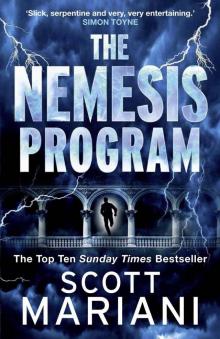 The Nemesis Program_Ben Hope
The Nemesis Program_Ben Hope The Shadow Project
The Shadow Project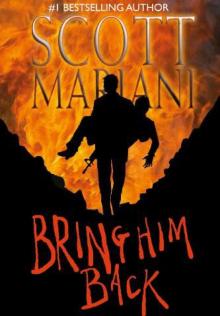 Bring Him Back
Bring Him Back Passenger 13
Passenger 13 Sacred Sword (Ben Hope 7)
Sacred Sword (Ben Hope 7) The Sacred Sword (Ben Hope 7)
The Sacred Sword (Ben Hope 7) Sacred Sword
Sacred Sword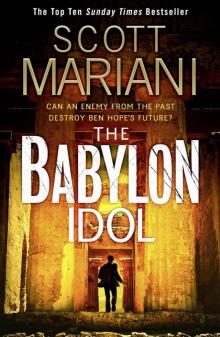 The Babylon Idol
The Babylon Idol The Armada Legacy
The Armada Legacy The Heretic's Treasure
The Heretic's Treasure The Martyr’s Curse
The Martyr’s Curse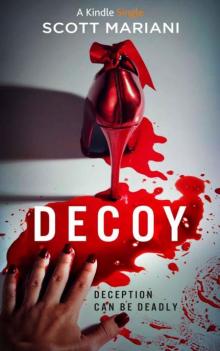 DECOY (Kindle Single)
DECOY (Kindle Single) The Bach Manuscript
The Bach Manuscript The Alchemist's Secret
The Alchemist's Secret The Mozart Conspiracy: A Novel bh-2
The Mozart Conspiracy: A Novel bh-2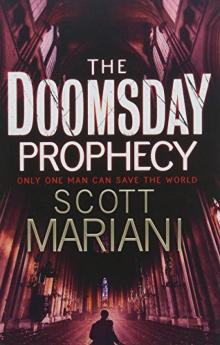 The Doomsday Prophecy
The Doomsday Prophecy The Ben Hope Collection: 6 BOOK SET
The Ben Hope Collection: 6 BOOK SET Star of Africa (Ben Hope, Book 13)
Star of Africa (Ben Hope, Book 13) Star of Africa
Star of Africa The Forgotten Holocaust (Ben Hope, Book 10)
The Forgotten Holocaust (Ben Hope, Book 10) The Devil's Kingdom
The Devil's Kingdom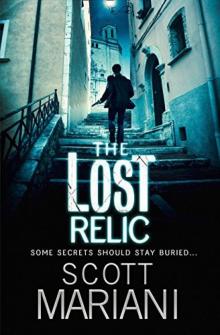 The Lost Relic
The Lost Relic The Armada Legacy bh-8
The Armada Legacy bh-8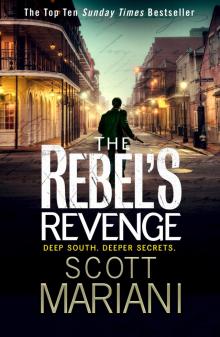 The Rebel's Revenge
The Rebel's Revenge The Forgotten Holocaust
The Forgotten Holocaust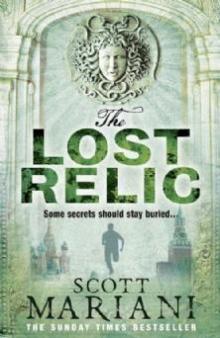 The Lost Relic bh-6
The Lost Relic bh-6 Ben Hope 05 - The Shadow Project
Ben Hope 05 - The Shadow Project The Mozart Conspiracy
The Mozart Conspiracy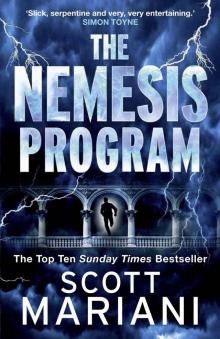 The Nemesis Program
The Nemesis Program The Martyr’s Curse (Ben Hope, Book 11)
The Martyr’s Curse (Ben Hope, Book 11) THE TUNNEL: A Ben Hope Story
THE TUNNEL: A Ben Hope Story The Sacred Sword bh-7
The Sacred Sword bh-7 The Moscow Cipher
The Moscow Cipher The Shadow Project bh-5
The Shadow Project bh-5 The Tunnel
The Tunnel The Moscow Cipher (Ben Hope, Book 17)
The Moscow Cipher (Ben Hope, Book 17)